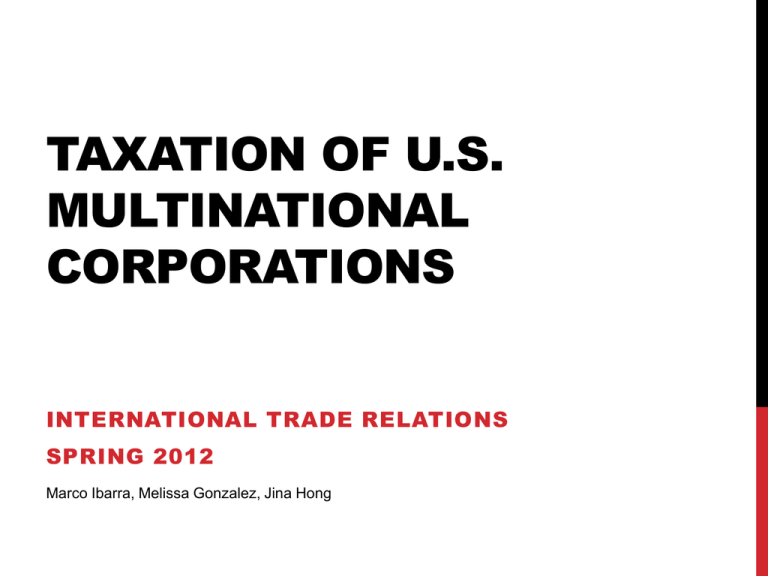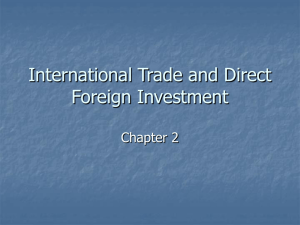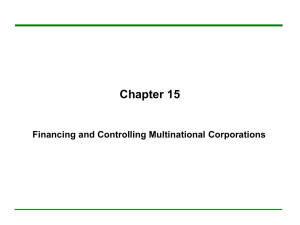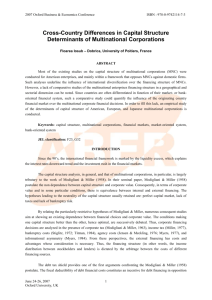Taxation of Multinational Corporations
advertisement

TAXATION OF U.S. MULTINATIONAL CORPORATIONS INTERNATIONAL TRADE RELATIONS SPRING 2012 Marco Ibarra, Melissa Gonzalez, Jina Hong OVERVIEW • Federal corporate tax rate is 35% • Tax rate is same for purely domestic firms and for U.S. multinational corporations (MNCs) who make profits abroad • MNCs pay an additional state corporate tax rate ranging from 4 to 6% • Current U.S. corporate tax system takes a worldwide approach • All foreign subsidiaries are subject to US taxation under the “worldwide income” concept OVERVIEW Therefore, U.S. MNCs: • Re-invest large portions of their income abroad in low-tax countries • Repatriate only a limited percentage of total income made in host countries • Also obtain U.S. tax credits for the foreign taxes paid on the total income made abroad OVERVIEW • Because of the shift to reporting income abroad, the U.S. corporate tax base remains narrow and corporate tax revenues as share of GDP low • Total share of U.S. corporate tax revenues as percentage of all tax receipts was 30% in 1950 and 6.6% in 2009 • U.S. corporate tax rate has not changed much since 1986 • Among OECD members, U.S. tax rate is considerably higher than average rate; 2nd highest • However, other OECD members raise more tax revenues LEGISLATION • Tax credits • • Firms are able to claim a tax credit for monies paid to governments abroad on income they earned in the foreign country (but only up to their U.S. tax liability on that income) The U.S. attempted to mitigate this problem by granting additional tax credits • • • The American Jobs Creation Act of 2004 replaced the tax subsidies for exporting with new corporate tax benefits Included a domestic production deduction- lowered the corporate tax rate by 3 percentage points on income from the domestic production activities of U.S. firms And for 1 year the tax rate on dividend repatriations from lowtax countries was reduced to 5.25% LEGISLATION • Cross crediting • Firms use excess credits from income earned in high-tax countries to offset U.S. taxes due on income earned in low-tax countries • Active Financing Exception (aka Deferral) • Firms are not taxed by the U.S. on its overseas income until that income is remitted to the U.S. parent firm as dividends • Abuse of Transfer Pricing MAJOR ISSUES • U.S. Corporate Tax Rate • Active Financing (GE Example) CORPORATE TAX RATES http://economix.blogs.nytimes.com/2011/04/08/the-logic-of-cutting-corporate-taxes/v TAX LOOPHOLES • Companies have a huge incentive to pretend that their American operations pay too much or charge too little to their foreign operations for goods and services (for tax purposes only), thereby minimizing their U.S. taxable income. • Transfer prices shift income away from the U.S. and shift deductible expenses into the U.S. • Transferring ownership of long-lived, often intangible but highly profitable assets, like patents and software to overseas subsidiaries. • Aggressive lobbying for tax breaks. GENERAL ELECTRIC • In 2010, GE reported profits of $14.2 billion, with $5.1 billion coming from operations in the U.S. • Tax bill for 2010 = 0; claimed a tax benefit of $3.2 billion. • Regulatory filings show that in the last 5 years, GE has accumulated $26 billion in American profits and received a net tax benefit from IRS of $4.1 billion, despite posting a loss in 2009 as a result of the financial crisis. • Fierce lobbying and “creative” accounting. GENERAL ELECTRIC FIERCE LOBBYING • In 2008, Congress threatened to let one of the most lucrative tax shelters expire. GE’s tax team met with representative Charles Rangel of the Ways and Means Committee, who subsequently reversed his opposition to the tax break. The following month, GE announced its foundation would award $30 million to New York City schools, including $11 million to schools in Rangel’s district. • In the past 10 years, GE has spent more that $200 million lobbying on Capitol Hill. CREATIVE ACCOUNTING • Consumer appliance division accounts for just 6% of GE’s revenue. • Industrial, commercial and medical equipment like power plant turbines and jet engines account for 50%. • Lobbying for changes in tax laws – depreciation schedules on jet engines to “green energy” credits for wind turbines. • Lending, through GE Capital, accounts for 30% Active Financing. ACTIVE FINANCING • Companies have long been allowed to defer taxes on income from overseas subsidiaries, but financial activities have traditionally been left out of this exemption because such activities are too easy to shift offshore. • Passed in 1997, active financing allows investment banks, brokerage firms, auto and farm equipment companies, and lenders like GE Capital to defer taxes on overseas profits, if those profits were derived by “actively financing” some activity or deal. • In other words, as long as a company claims that it intends to indefinitely invest profits outside of the U.S., they remain untaxed. ACTIVE FINANCING • Proponents of active financing claim that the exemption helps “level the playing field” with foreign competitors by ensuring the U.S. corporations aren’t taxed twice. • Enhances competitiveness of U.S. corporations since many other countries have a much lower corporate tax rate and do not attempt to tax foreign income. ACTIVE FINANCING • Opponents claim that the tax break creates an enormous tax shelter for companies who have lobbied it into law. • It encourages companies to create jobs overseas instead of in the United States. • The Joint Committee on Taxation estimates that the provision, which was extended for two years in 2010, will cost $9.61 billion in the two years to 2011. • Other countries have broadened their tax base, which has allowed them to increase tax revenue as a share of GDP • Majority of other industrially advanced countries have revised and lowered their corporate tax rates PROPOSAL Lower U.S corporate rates • White House Framework for Business Tax Reform: • Presented in Feb 2012. • Lowering the top income-tax rate for corporations from 35 percent to 28 percent . REACTIONS From multinational corporations: • Strong support although they point out that U.S. multinationals would still be paying higher taxes than their foreign rivals From liberal groups (opposing view): • Need to eliminate corporate tax loopholes but without reducing the rates since there is a need for more revenue to address U.S long-term budget crisis. BENEFITS AND IMPACT • Promote higher long-term economic growth. • Improve U.S. competitiveness. • Lead to higher wages and living standards. • Boost entrepreneurship, investment, and productivity. • Can attract foreign direct investment (FDI). • Lowers the tax burden on low-income taxpayers and seniors. • Lead to lower corporate debt and reduce the incentives for income shifting. • Reduce compliance costs. PROPOSAL Do not extend active financing provision • The (FY) 2013 Budget propose extending the active financing exceptions REACTIONS Opposing View: • This exception helps "competitiveness" or "fairness“ for it allows US financial companies to compete on a level playing field with their foreign competitors when they go into overseas markets. Proponents: • As companies move abroad, they also move their manufacturing bases abroad to be closer to home as well as jobs. • Costs taxpayers US$5 billion a year. BENEFITS AND IMPACT • Its just another additional deficit to the U.S. budget. • Provides less of an incentive for multinational corporation to allocate their profits to foreign tax havens. • Addresses the issue of how companies shift income to other nations.









